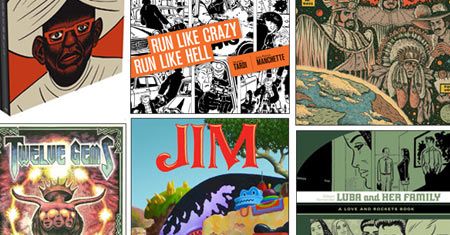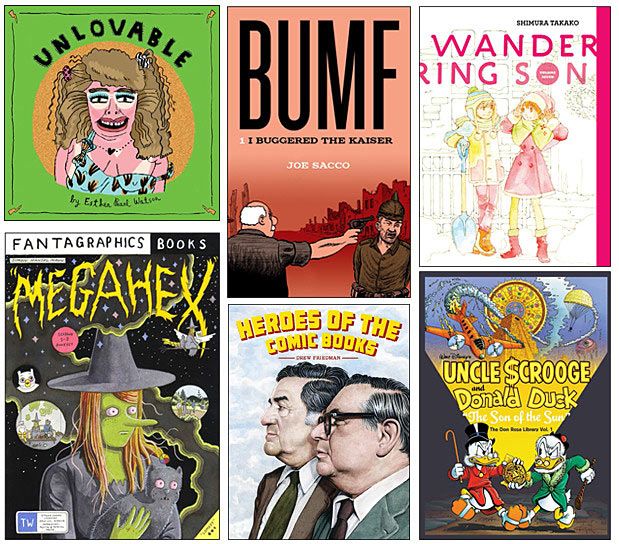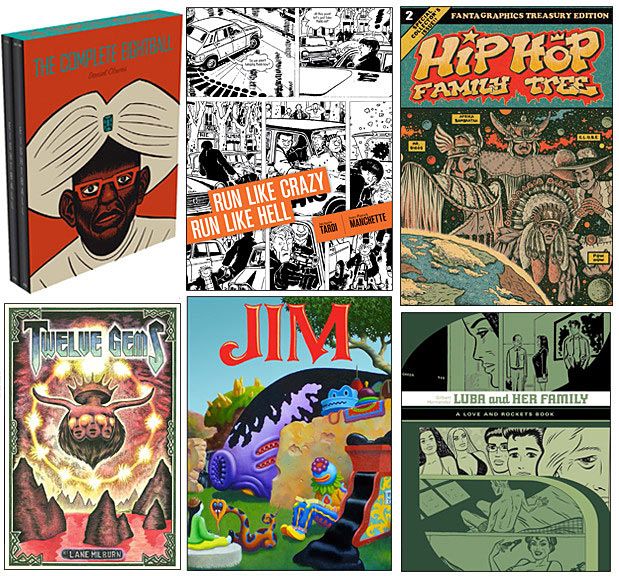Paul Constant, the Books editor of "The Stranger" oversaw a conversation with Gary Groth, Eric Reynolds and Kristy Valenti at Emerald City Comicon about Fantagraphics Books. Constant opened the panel by talking about the death of Fantagraphics co-publisher Kim Thompson and asked about the Kickstarter campaign the publisher launched last year.
"We were in great financial shape, that's why we did it," Groth said to laughter. He explained that Thompson stopped working when he was diagnosed with lung cancer and that after his death they saw that there were more than a dozen books Thompson was overseeing that had been abandoned and while none were huge sellers, they were all profitable, which caused a financial shortfall.
The fulfillment is proceeding with some already finished and the prints being printed next week.
EXCLUSIVE: Fantagraphics Launches $150K Kickstarter to Fund 2014 Season
As far as whether they would ever do it again, Groth joked that it was easier than getting a bank loan, but it was possible. Reynolds made the point that one aspect of it they did not predict was how much attention it generated for the books, which tends not to happen until close to the publication date.
When asked about whether they were finding new work to translate, something that was one of Thompson's great skills, Groth admitted that they're currently finishing the work they've already committed to do and are not looking for anyone new right now. Reynolds made the point that the process has always happened organically, either through cartoonists submitting their work or books found at conventions.
As far as the EC reprint volumes that Fantagraphics has been publishing, the artists volumes was Groth's original concept which he pitched to the rights holders. "They've only ever been republished as facsimile editions of the titles. I thought it would be a new way to package these and reach outside the traditional EC fans," Groth said. "Jacob Covey initiated the design and he did a bang up job."
Constant brought up the many young artists being published by Fantagraphics and asked how that happens. "Comics is a small community and when an artist of some significant stature arises, you're aware of it," Groth said. "You see the work come out, you see them at conventions, on the web." He said that they approach some artists while other artists approach them.
Groth is currently finishing the collection of "Zap Comix." "'Zap' was created by Robert Crumb in 1968 and it didn't start the underground comics movement, but it was the most symbolic comic that defines the underground comics movement. That last issue, #16, will be published in the collection."
"We're scanning from the negatives so this will be the best edition ever published. Better than the original comics. This is a landmark in the history of comics," Groth said. "Aesthetically, possibly the most important comic ever published."
The three also discussed how shocking and disturbing the transgressive comic remains today and how one issue was was prosecuted for obscenity. It was also noted that because of the children in the audience they would avoid discussing it in any detail.
RELATED: Fantagraphics Celebrates 35 Years of Publishing
Constant brought up Ed Piskor's recent "Hip Hop Family Tree," a bestseller Reynolds admitted exceeded all expectations. "It's being reprinted a third time. The second book comes out in August and this Fall we'll have a box set of one and two," Groth said. "The box set will include a special comics insert that's a terrifying homage to Image Comics of the '90s."
"In the '90s, Spike Lee directed a jeans commercial with Rob Liefeld and it's this epic point where hip hop and comics culture met," Reynolds said.
Constant asked about webcomics and Groth admitted he's thought about it. "I'm interested in books with small print runs, maybe a few hundred copies," Groth said. "We get work that is good that is interesting, and should be out there, but I know they're only going to sell a few hundred copies. I'm looking into how to make that happen."
As far whether Disney's acquisition of Marvel had changed their contract in terms of Disney reprints, Groth said it didn't and they're actually expanding the line. "We're doing the < href="https://www.comicbookresources.com/tag/don+rosa">Don Rosa books. The first volume will be out in two or three months. We're recoloring all of Don Rosa's work in accord with his wishes. It's the first time the coloring is precisely to his liking."
Reynolds admitted that he misses regularly publishing floppies because he feels that there's something about the comic book that's very valuable to both readers and cartoonists. "I think of cartoonists like Dan Clowes and Chester Brown and it's hard to imagine them having the careers they've had without doing comics and figuring out what worked and what didn't," Reynolds said. "Now everybody wants to make a great American graphic novel as soon as they graduate from college and I have concerns about whether that's great or not."
Turning to the city of Seattle, Constant pointed out how the city has embraced Fantagraphics and that when the city applied to be a UNESCO City of Literature, Fantagraphics was a part of its application. "I feel like we've become an institution," Groth said.
RIP: Fantagraphics Co-Publisher Kim Thompson
"When I first moved here in '93, very few people knew who Fantagraphics was," Reynolds said, not taking for granted when city residents or people from out of town visit the bookstore or come to events.
Groth pointed out that there was a cartoon scene here which grew with the company which arrived in Seattle in 1989. "It was a magnet for cartoonists," Groth said. "My impression is that lessened in the 2000s, but it's come back over the past few years. The store helped cultivate a more communal sense."
"There was a weird period in the '90s when cartoonists seemed to move here every week," Reynolds said. "Maybe we were a catalyst of that," Groth said uncertain.
When it was pointed out that Groth seems less angry now than he did in the pages of The Comics Journal in the '80s and '90s, Reynolds joked, "I think you're still angry."
"In the '80s and '90s there were battles to be fought and battles to be won. I think many have been won," Groth said, pointing out that the magazine championed the rights of artists and those ideas have been accepted by most people and that there is much more respect for artists. "I don't have the energy to pay attention to the degradation of mainstream comics," Groth admitted, "but a lot of what we were fighting for has come to pass."
When asked if he is hopeful about the industry, Groth said, "I don't know what that means. Probably not."
Constant asked whether there were any plans to resurrect "Amazing Heroes," the longtime magazine about superheroes that Kim Thompson had edited for many years. Valenti made the point that TCJ.com covers a lot of ground, even if it's not "Amazing Heroes." Groth said the magazine was started as an alternative to the buyers guide, which he described as brain-damaged and when "Wizard" started in '93, the conversation about superheroes deteriorated and now online it's even worse.
Stay tuned to CBR for more on Fantagraphics' upcoming projects.



